Announcements
In addition to basic health and hygiene practices, like handwashing, CDC recommends some prevention actions at all COVID-19 Community Levels, which include:
- Staying Up to Date with COVID-19 Vaccines
- Improving Ventilation
- Getting Tested for COVID-19 If Needed
- Following Recommendations for What to Do If You Have Been Exposed
- Staying Home If You Have Suspected or Confirmed COVID-19
- Seeking Treatment If You Have COVID-19 and Are at High Risk of Getting Very Sick
- Avoiding Contact with People Who Have Suspected or Confirmed COVID-19
Put together your COVID-19 plan so you have all the information you need on hand if you get sick with COVID-19.
Preparing your family for an emergency is as simple as having a conversation over dinner. Make a plan tonight!
You can also take note of what you need for your emergency kit. Next time you're at the store, pick up those items.
Rapid COVID-19 test results could help guide public health responses, but these results are typically not reported. Now, NIH has launched a website to anonymously report the results of these at-home tests in a secure manner. Check it out here: https://makemytestcount.org?utm_medium=affiliate&utm_source=nibib&utm_campaign=site-launch
In a minor fender-bender? Here are some tips on clearing it out of the road quickly:
- Move your vehicle to the side of the road and inspect it there - not in dangerous travel lanes.
- Often, a primary crash leads to a traffic backup and increases the risk of secondary crash, which can be more sever than the original collision.
- Vehicles involved in a non-injury crash that remain operable, according to Arizona law, must be removed from the roadway.
- Emergency responders - police, fire, tow truck operators, etc. - need a safe place to work, too. On average, a tow truck operator is struck and killed every six days in the US.
In the midst of the holiday season, U.S. COVID-19 cases, hospitalizations, and deaths have increased in recent weeks. More than 44% of U.S. counties are experiencing medium to high COVID-19 Community Levels. At the same time, this cold and flu season has been a severe one. The trio of COVID-19, flu and respiratory syncytial virus (RSV) is continuing to stress the healthcare system, resulting in decreased hospital capacity and staffing shortages.
Vaccination remains the best way to stay protected against severe infection from COVID-19 and flu, protect loved ones, and keep our communities safe. But uptake of the COVID-19 updated (bivalent) booster has been low—150 million people ages 5 years and older are eligible for the updated booster but have not yet gotten it. Among adults ages 65 years and older, who are at highest risk of becoming severely ill with COVID-19, 28 million people are eligible but have not yet gotten an updated booster.
CDC recommends that people ages 5 years and older receive one updated (bivalent) booster if it has been at least 2 months since their last COVID-19 vaccine dose, whether that was:
- Their final primary series dose, or
- An original (monovalent) booster
People who have gotten more than one original (monovalent) booster are also recommended to get an updated (bivalent) booster.
Call Fort Yuma IHS (760) 572-4711 to make your appointment now.
Help prevent the spread of respiratory viruses like COVID-19, flu and RSV this holiday season. Get vaccinated and boosted, stay home & test if sick, wear a mask, wash your hands, and cover your cough/sneeze. Learn more: https://www.cdph.ca.gov/Programs/CID/DCDC/CDPH%20Document%20Library/winter-virus-tips-fact-sheet.pdf.
By now you may be aware of the national, state, and local reports of surges in hospitals due to a severe respiratory season, driven by RSV, influenza and COVID-19. It is important to treat mild symptoms at home, moderate symptoms at your primary care provider (family doctor) or urgent care, and to only seek care in the emergency room when symptoms become severe. This will help to prevent a surge in the emergency room, and keep space available for the most critical patients.
Fort Yuma IHS (760)572-4711.
The federal government's free test kit program is back. Anyone who visits covidtests.gov may order four more at-home test kits. Kits will be delivered free of charge via U.S. Mail.
Getting children and teens vaccinated can help protect them from getting really sick if they get COVID-19. Here's what parents and caregivers need to know about COVID-19 vaccination.
It is going to be cold again tonight and into Thursday morning with lows in the mid to low 30s. Check that pets are indoors and plants are protected. Don't forget to grab a coat or jacket if you need to go outdoors.
- Pipes: cover pipes exposed to cold temperatures.
- Plants: bring sensitive plants indoors or cover with blankets.
- Pets: bring Fido indoors! The cold hurts them too.
- People: wear clothing like jackets, sweaters, and long pants.
COVID-19 will remain with us for the foreseeable future and using good hygiene habits provides protection to have safe holiday events.
For many, events help us stay connected to one another. They provide an opportunity for socialization and shared experiences which improve our mental health and well being. If we continue to practice good hygiene habits and staying home when sick, we can reduce our risk.
The signal word warns you about a product's short term toxicity before its diluted. It tells you the pesticide's ability to harm human health. Pesticide labels use thee signal words: CAUTION, WARNING, or DANGER. If you are searching for less toxic pesticides, look for CAUTION on the label.
Always read and follow all label directions. EPA requires signal words be printed on the front of labels in capital letters. Signal words refer to the entire product, not just the pest-controlling active ingredients.
Pesticides can poison you if you eat them, breathe them in , or get them on our skin and eyes. Even products that are less toxic, natural, or organic can be hazardous. It depends on how much and where someone is exposed.
Canfind the signal workd or have other question about health and safety? Call NPIC at (800) 858-7378 from 8:00 am to 12:000 pm Pacific Time Monday through Friday.
To report a pesticide incident please contact the Quechan Pesticide Enforcement and Control office at (760) 572-0771 or email at pesticidesofficer@quechantribe.com. Please ensure to leave contact infomation such as: Name, Phone number and Address.
A post-Thanksgiving uptick in covid-19 patients at U.S. hospitals is arriving even as health systems contend with waves of individuals stricken with RSV and influenza infections.
Building a good defense will help prevent severe illness and hospitalization from the flu, COVID-19, and respiratory syncytial virus (RSV).
Get Vaccinated, Boosted (and Treated)
Getting your flu and COVID-19 vaccines are the best way to reduce the chances of getting severely ill. If you test positive for COVID-19 and have symptoms, speak to a health care provider right away about treatment.
Wear a Mask
There is no vaccine for RSV, so wearing a mask can slow the spread and protect the most vulnerable, including babies, young children, and older adults.
Wash Your Hands
Frequently wash your hands with soap and warm water for at least 20 seconds. This is one of the easiest and most effective ways to prevent spreading germs.
Planning for the holidays? If you haven’t already, plan to get your Covid19 booster and flu shot at least two weeks before the big day. The vaccines need that time to build up your defenses against these viruses and avoid serious illness. Make your appointment at Ft. Yuma IHS, local pharmacy, doctor’s office, or clinic.
Help is in your hand with the Red Cross Mobile Apps.
- First Aid App: Put expert advice for everyday emergencies in the palm of your hand. Get instant access to first aid information for the most common emergencies.
- Earthquake App: Get notifications when an earthquake occurs, review how to keep you and your family safe, even if the power is out.
- Wildfire App: Track the path of wildfires, get notifications on what to do during a wildfire and stay safe with tools such as a strobe light, flashlight and audible alarm.
Finish with Red Cross Mobile Apps. Apps available on first aid, earthquake, wildfire, hurricane, tornado, pets, CPR and more.
Get instant access to expert advice for common first aid events and other emergencies. With Red Cross Mobile Apps-help is in your hand. Text "APPS" to 90999 or download in Apple iTunes or on Google Play.
redcross.org/mobileapps
All COVID boosters are now the bivalent formula, which is authorized for all ages 5+. The new booster will protect you from serious illness as new variants circulate.
https://publichealth.jhu.edu/Bivalent-Covid-19-Booster-Updates
Frying food puts you at greatest risk of cooking fires. Before you fry a turkey, review these tips to keep you and your loved ones safe.
-
Turkey fryers can tip over easily, spilling hot cooking oil over a large area. Make sure your turkey fryer Is on a sturdy, level surface and do not move it once It is In use.
-
Make sure it is at least 10 feet from your home and not under roof eaves.
-
An overfilled cooking pot will cause cooking oil to spill when the turkey is put in.
Test the amount of oil you need by filling your fryer with water. Place the turkey in the pot making sure the water doesn't get too close to the top. Measure the water and use that as a guide for filling the pot with oil. -
A partially frozen turkey will cause cooking oil to splatter when you put it In the cooking pot. Make sure your turkey Is fully thawed without frost on it before you fry it.
-
Without thermostat controls, deep fryers can overheat oil to the point of starting a fire.
If your turkey fryer does not have a thermostat, use a kitchen thermometer that attaches to the side of the pot This will help you monitor the temperature of the oil. -
The sides of the cooking pot, lid and pot handles can get dangerously hot.
Always use protective oven mitts. Keep children and pets at least 3 feet from the turkey fryer. -
Consider using an electric or air fryer.
Antibiotics do not work for viruses like flu or COVID-19, but other medications, like antivirals, can treat viruses. If you’re sick, ask your healthcare professional about the best way to treat your illness.
Learn more during U.S. Antibiotic Awareness Week: https://bit.ly/3DfaQvR.


.jpg)

.jpg)
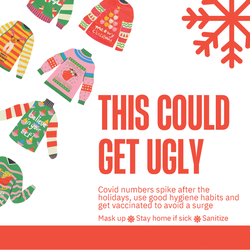
.png)
.png)
.jpg)
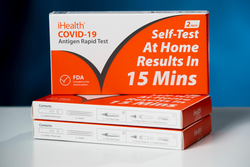
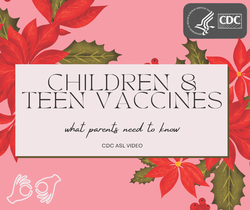
.jpg)
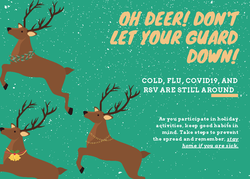
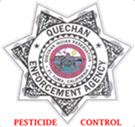
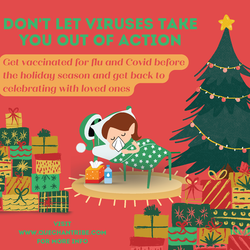
.jpg)
.png)
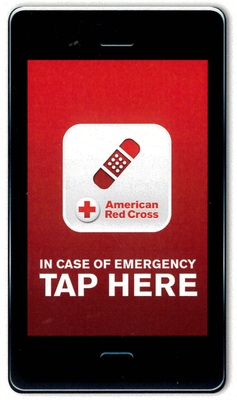
.png)
.jpg)
.jpg)
